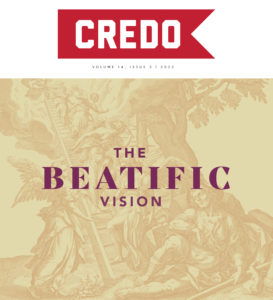
The Beatific Vision and Augustine
T he visio dei—vision of God—or often rendered as the beatific vision consists of seeing God. The beatific vision consists of living, experiencing happiness, and true blessedness. The beatific description of one’s vision corresponds to the Latin term, beatus, which is rendered as makarios in Greek and asher in Hebrew. The vision consists of one’s sight of God. The beatific vision is a beholding of God that renders life and happiness, and provides fullness, perfection, and flourishing for the one who sees. Moreover, this visio dei becomes ingrained in the Christian interpretive imagination based on the New Testament and the theological creativity of Augustine. According to Severin Kitanov,
he visio dei—vision of God—or often rendered as the beatific vision consists of seeing God. The beatific vision consists of living, experiencing happiness, and true blessedness. The beatific description of one’s vision corresponds to the Latin term, beatus, which is rendered as makarios in Greek and asher in Hebrew. The vision consists of one’s sight of God. The beatific vision is a beholding of God that renders life and happiness, and provides fullness, perfection, and flourishing for the one who sees. Moreover, this visio dei becomes ingrained in the Christian interpretive imagination based on the New Testament and the theological creativity of Augustine. According to Severin Kitanov,
The concept of beatific enjoyment is a theological, not a philosophical concept; it is the concept of religious, not secular enjoyment. Based on New Testament allusions to the indescribable experience of heavenly bliss in the presence of God, the concept of beatific enjoyment became a staple of Christian systematic theology thanks to Church Father and Saint Aurelius Augustine. St Augustine developed the concept both as a way of giving a teleological orientation to Christian learning and as a way of distinguishing the Christian ideal of heavenly beatitude from rival philosophical — Neo-Platonic and Stoic — conceptions of human flourishing.
“Blessed are the pure in heart,” as Jesus instructs, “for they will see God” (Matt. 5:8). For Augustine, the beatific vision or beatific enjoyment is somewhat distinct from his contemporary philosophers, only experienced in the pure sight of God, anchoring the happiness of one’s life, partially felt now, and eternally realized in heaven.
For Augustine, the beatific vision is only experienced in the pure sight of God, anchoring the happiness of one’s life, partially felt now, and eternally realized in heaven. Click To TweetIn On the Happy Life, Augustine begins a dialogue with the following sentiment: “We want to be happy.” Before finishing this statement, Augustine expresses how these dialogue partners concur and agree “with one voice.” Regarding happiness, much has not changed. If we begin to consider our Christian life, I am certain we still want happiness to mark our lives. I want to be happy; I do not want to be sad. I want fullness and joy and happiness. Augustine rehearses these comments from a philosophical heritage on happiness. Happiness is the “highest of all goods” and is the category that “most people virtually agree” (Nic. Eth. 1.4). As Aristotle continues, happiness is “living well and doing well,” even though many cannot agree on what this happiness might be. In the first century CE, the Stoic Philosopher, Seneca the Younger, begins On the Happy Life: “Everyone, brother Gallio, desires to live happily but are dull at perceiving exactly what is it that makes life happy.” Aristotle, Seneca, and Augustine each point to this universal principle: all want happiness, but not all are able to draw out what true happiness might be.
Whereas Augustine captures an ordinary reality (i.e., universal happiness), he anchors this happiness in the sight of God. The beauty of God draws Augustine away from his self-infirmities. However, the perpetual gaze upon God remains impossible: “I was astonished to find that already I loved you, not a phantom surrogate for you. But I was not stable in the enjoyment of my God. I was caught up to you by your beauty and quickly torn away from you by my weight” (Conf. 7.17). The ontology of God and beauty initially prompts Augustine’s vision of God. And yet, Augustine cannot remain “transported,” so to speak, in the presence of God simply because of the weight of his interior life.
The eschatological vision in the City of God is marked by both incomprehensible descriptions and a vision of God face to face (Civ. 22.29–30). When quoting 1 Corinthians 13:9 and 12, and Matthew 18:10, Augustine considers the heavenly vision of angelic sight. As angels are currently in heaven, they already see God. When we are delivered from the domain of darkness, given the Spirit, we become “fellow citizens” with the angelic realm. He quotes Matthew 18:10 and focuses on the phrase, “their angels in heaven always behold the face of my Father in heaven.” When we arrive in heaven, we possess the “vision” that John describes in 1 John 3:2 (“when he appears, we will be like him, for we will see him just as he is”) because, as Augustine comments, “By ‘the face’ of God we are to understand His manifestation, and not some part of the body such as we have and which we call by that name.” So, if we were to ever “blink” our eyes in heaven, there would still be no moment that our gaze upon God has ceased.
As Augustine moves towards different topics in Civ. 22.30, he intersects happiness, virtue, and the chief good of having God. Thus, in heaven, glory will be undiminished and true glory. Honor will never be denied. And the peace of God will have full reign. The greatest of all virtues received will be the very Giver of virtue, God. Furthermore, all of one’s happiness will be satiated in one’s perpetual sight of God: “God will be the end of our desires. He will be seen without end, loved without sting, praised without weariness. And this duty, this affection, this employment, will, like eternal life itself, be common to all” (22.30). In the culmination of one’s life and a person’s experiences in heaven, they will have perpetual sight of God that will satiate all desires and insufficient earthly expressions.
The above excerpt is from the latest issue of Credo Magazine. Click here to read the full article!

